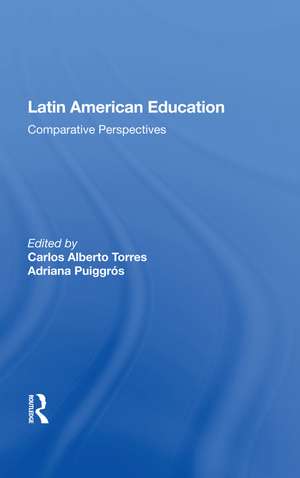Latin American Education: Comparative Perspectives
Editat de Carlos Alberto Torresen Limba Engleză Hardback – 7 iun 2019
Preț: 771.63 lei
Preț vechi: 1031.77 lei
-25% Nou
Puncte Express: 1157
Preț estimativ în valută:
147.65€ • 154.57$ • 122.17£
147.65€ • 154.57$ • 122.17£
Carte tipărită la comandă
Livrare economică 07-21 aprilie
Preluare comenzi: 021 569.72.76
Specificații
ISBN-13: 9780367007195
ISBN-10: 0367007193
Pagini: 384
Dimensiuni: 144 x 222 mm
Greutate: 0.87 kg
Ediția:1
Editura: Taylor & Francis
Colecția Routledge
Locul publicării:Oxford, United Kingdom
ISBN-10: 0367007193
Pagini: 384
Dimensiuni: 144 x 222 mm
Greutate: 0.87 kg
Ediția:1
Editura: Taylor & Francis
Colecția Routledge
Locul publicării:Oxford, United Kingdom
Cuprins
Introduction: The State and Public Education in Latin America1 -- The Political Economy of Educational Reform in Latin America -- Financing Education for Democracy in Latin America -- Education Policy and Human Development in the Latin American City -- Neoliberal Education Policies in Latin America: Arguments in Favor and Against -- Basic Education in Latin America -- Dewey Under South American Skies: Some Readings from Argentina -- Contemporary Brazilian Education: Challenges of Basic Education -- The Problems of the Decentralization of Education: A View from Mexico1 -- Teacher Education Reform Initiatives: The Case of Mexico -- Higher Education in Latin America: Argentina in Comparative Perspective -- The Paradox of the Autonomy of Argentine Universities: From Liberalism to Regulation -- University Restructuring in Argentina: The Political Debate -- Women, Education, and the State in Cuba -- Popular Education in Latin America: Old and New Dreams -- Freire, Frei, and Literacy Texts in Chile, 1964–19701 -- Popular Education and the Reconstruction of El Salvador1
Descriere
This book offers a relevant sample of the current research on Latin American education in comparative perspective. In their introduction, Torres and Puiggrós, two of the most recognized researchers of Latin American education, draw from political sociology of education, theories of the state, history of education, and deconstructionist theories to focus on changes in state formation in the region and its implications for the constitution of the pedagogical subject in public schools. Throughout the different chapters, the contributors present and analyze the most relevant topics, research agendas, and some of the key theoretical and political problems of Latin American education.
